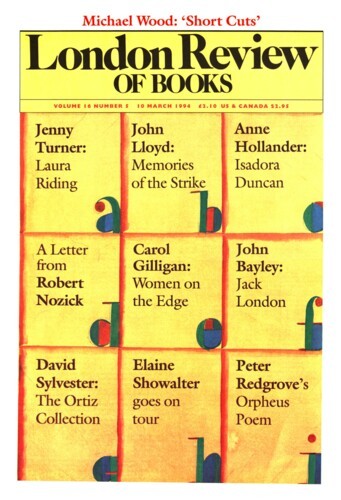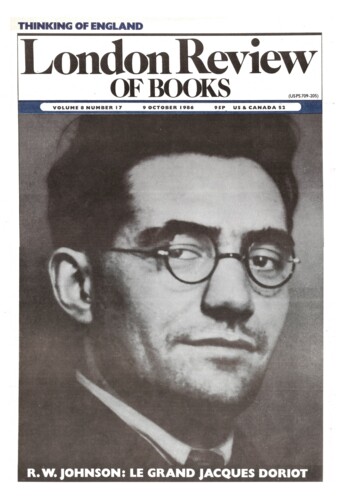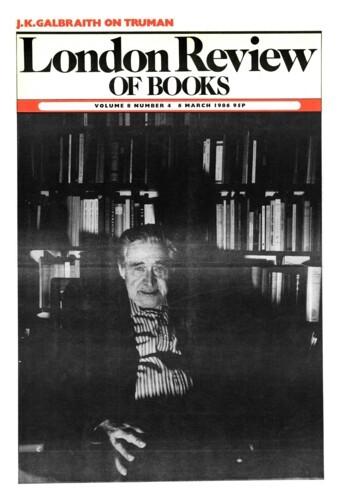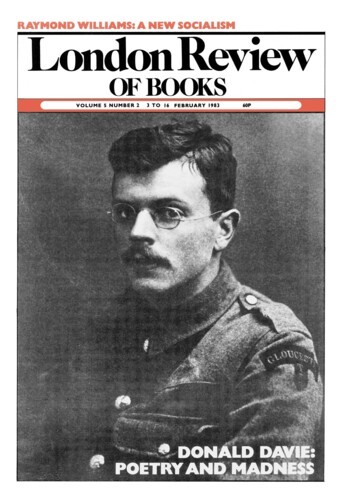Martin Seymour-Smith
Martin Seymour-Smith is the author of Guide to Modern World Literature, which came out in a revised edition last year, and of a biography of Robert Graves.
Hello to All That
Martin Seymour-Smith, 9 October 1986
This is the first volume of a projected three-volume ‘definitive’ biography of Robert Graves by his nephew, Richard Perceval Graves. It takes over where the author’s father, Robert’s younger brother John Graves, left off. John, who died in 1980, had been described by Robert as a ‘typically good pupil of a typically good school’ (to which he returned as teacher); he had for long contemplated the composition of a book called My Brother Robert. The outstanding virtue of his son’s first volume – which almost exhausts the private information he holds, mainly derived from the diary of the poet’s father Alfred Perceval Graves – is that it is a worthy completion of the task John Graves set himself. He would not have gone beyond 1931 and the death of Alfred Perceval. As Richard Perceval Graves remarks, John was ‘a devout Christian, a loving father, and a most honourable, unselfish man’. The difficulties begin here. This author, who has written accounts of the lives of T.E. Lawrence, Housman and the Powys brothers, closely resembles his father. But Robert Graves did not at all closely resemble his ‘typically good’ brother; nor does he resemble his ‘typically good’ son – who, although he has ‘known’ and ‘loved’ his uncle ‘since childhood’, did not know him very well at all, and was never the recipient of his confidences. Nor, for that matter, was Robert capable of speaking in the moralistic terms employed by Richard Perceval. But his family for the most part (there are exceptions) was – and is. This gives The Assault Heroic an unexpected dimension.’
The Strange Case of Peter Vansittart
Martin Seymour-Smith, 6 March 1986
Peter Vansittart, novelist, historian and writer for children, has been singled out for praise by critics as diverse as Philip Toynbee, Francis King, Angus Wilson and Andrew Sinclair. All feel that he lacks the large audience he deserves. Yet the curious reader, anxious to gain more information about this somewhat enigmatic writer, of undoubted power (and above all vision), may easily find himself defeated. He is not even included in the massive – if frequently trivial and banal – Contemporary Novelists. He is omitted from surveys of literature (even by those who have praised him). This is certainly undeserved neglect: but could it also be that critics find it difficult to explain him?
Masculinism
3 February 1983
Pieces about Martin Seymour-Smith in the LRB
Old Gravy
Mark Ford, 7 September 1995
‘Since the age of 15 poetry has been my ruling passion and I have never intentionally undertaken any task or formed any relationship that seemed inconsistent with poetic principles; which...
His Only Friend
Elaine Showalter, 8 September 1994
In the midst of writing his biography of Philip Larkin, Andrew Motion was contacted by a spiritualist who claimed to have been speaking to Larkin in the Beyond; later Larkin sent a posthumous word...
Beastliness
Harry Ricketts, 16 March 1989
Speculation, Leon Edel remarks in his one-volume life of Henry James, is ‘the stock-in-trade of all biographers’. But if all biographers speculate, some do so more scrupulously and...
Queen Famine’s Courtier
Paul Delany, 3 February 1983
A poetic career as long as an average life-span – from 1908 to 1975 – should provide plenty of grist for the biographer’s mill. But here, as in other respects, Robert Graves is...
Read anywhere with the London Review of Books app, available now from the App Store for Apple devices, Google Play for Android devices and Amazon for your Kindle Fire.
Sign up to our newsletter
For highlights from the latest issue, our archive and the blog, as well as news, events and exclusive promotions.




